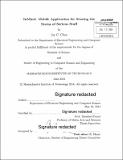| dc.contributor.advisor | Rosalind Picard. | en_US |
| dc.contributor.author | Chen, Joy C., M. Eng. Massachusetts Institute of Technology | en_US |
| dc.contributor.other | Massachusetts Institute of Technology. Department of Electrical Engineering and Computer Science. | en_US |
| dc.date.accessioned | 2014-11-04T21:37:25Z | |
| dc.date.available | 2014-11-04T21:37:25Z | |
| dc.date.copyright | 2014 | en_US |
| dc.date.issued | 2014 | en_US |
| dc.identifier.uri | http://hdl.handle.net/1721.1/91447 | |
| dc.description | Thesis: M. Eng., Massachusetts Institute of Technology, Department of Electrical Engineering and Computer Science, 2014. | en_US |
| dc.description | 30 | en_US |
| dc.description | Cataloged from PDF version of thesis. | en_US |
| dc.description | Includes bibliographical references (pages 105-108). | en_US |
| dc.description.abstract | Individuals under unusual stress, whether due to bereavement, illness, serious conflict, or other transitions can benefit from social support. Support is a valuable resource, but there are many psychological and technical obstacles that can get between an individual and those he gets support from. I am studying how the needs of these individuals are met or not met, how technology is involved, and what can help. To compliment and improve upon existing communication strategies, I designed InMind, an Android application that mediates life-issue tracking between close relations. InMind helps individuals communicate the status of important topics in their lives and express their thoughts related to the topics, adding to awareness of these issues. We deployed InMind for 3 weeks, with 7 groups of size 3 to 4 each. Only one group had full participation, while the others were dominated by 1 or 2 participants. By the end, the participants sent over 1000 messages through InMind and they reported better than average usability experience (p=0.0136). A majority of the users brought topics from within InMind to other media, such as emails or phone calls. Interview results from 15 participants showed strong asymmetry in awareness and different preferences for degree of sharing and support from loved ones. Participants were split between those who were sensitive to the privacy of their status and a few who would prefer that everything be public. There were often only a few active participants within a group; the active participants found value in using InMind for self-reflection. Conducting studies that study strong-tie relationships have to overcome the difficulty of getting participation from each member of the relationship. | en_US |
| dc.description.statementofresponsibility | by Joy C. Chen. | en_US |
| dc.format.extent | 108 pages | en_US |
| dc.language.iso | eng | en_US |
| dc.publisher | Massachusetts Institute of Technology | en_US |
| dc.rights | M.I.T. theses are protected by copyright. They may be viewed from this source for any purpose, but reproduction or distribution in any format is prohibited without written permission. See provided URL for inquiries about permission. | en_US |
| dc.rights.uri | http://dspace.mit.edu/handle/1721.1/7582 | en_US |
| dc.subject | Electrical Engineering and Computer Science. | en_US |
| dc.title | InMind : mobile application for sharing the status of serious stuff | en_US |
| dc.title.alternative | In Mind : mobile application for sharing the status of serious stuff | en_US |
| dc.title.alternative | Mobile application for sharing the status of serious stuff | en_US |
| dc.type | Thesis | en_US |
| dc.description.degree | M. Eng. | en_US |
| dc.contributor.department | Massachusetts Institute of Technology. Department of Electrical Engineering and Computer Science | |
| dc.identifier.oclc | 893855778 | en_US |
